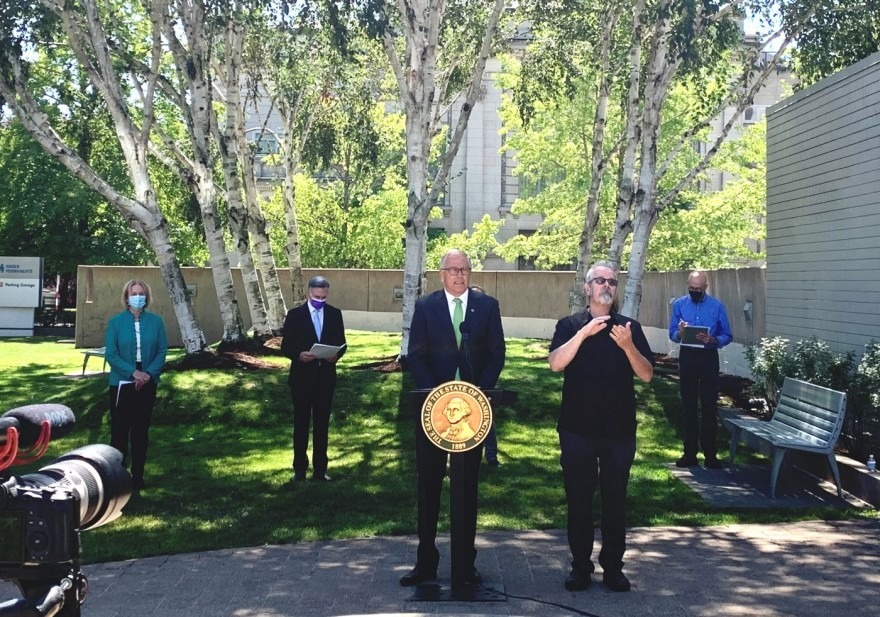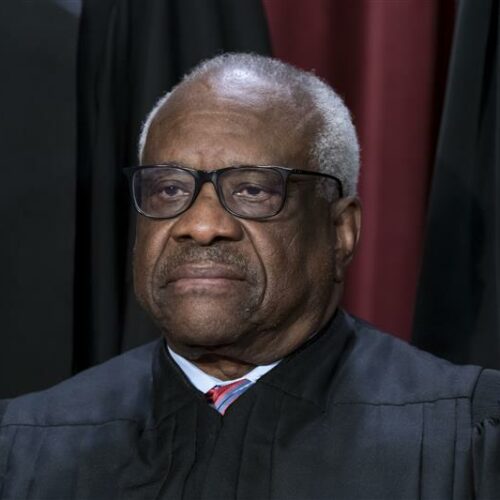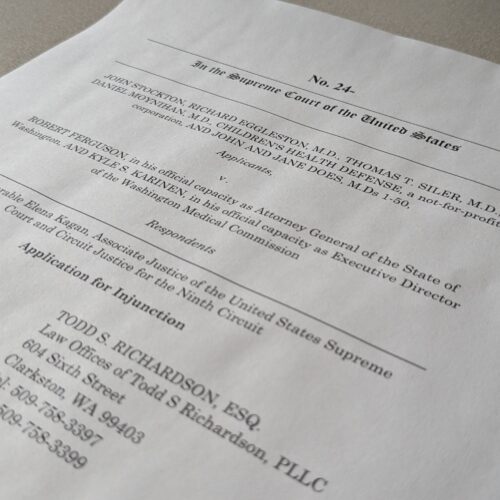As Gov. Jay Inslee’s October 18 vaccine mandate deadline approaches, more than 800,000 state employees, health care and long-term care workers, as well as people working in educational settings must prove they are fully vaccinated against COVID-19 — or face losing their jobs.
But one large sector of caregivers is explicitly exempt. The governor’s August 9 proclamation carved out approximately 46,000 homecare workers who are represented by the Service Employees International Union (SEIU).
These are people who are paid by the state to care for elderly or disabled clients or family members in their own homes.
Inslee’s proclamation specifically said individual providers, as they’re known, are not considered health care providers for purposes of the vaccine mandate.
In a statement, an Inslee spokesperson characterized it as a “hard decision” to exempt homecare workers, but defended the carve-out as necessary to address the unique nature of the workforce.
“One of the biggest reasons is that many of our home care providers provide personal care services to family members,” Tara Lee, Inslee’s communications director, said in an email. “Staff determined that mandating vaccines within those familial relationships would be challenging to implement, hard on family relationships and potentially difficult to monitor and enforce.”
Additionally, Lee said, there was concern that if an individual provider refused to get vaccinated it would leave their client without care and potentially force them into a facility.
“Many individuals receiving care in their own home have one caregiver and if that person is no longer available, they do not have another option,” Lee said.
A similar exemption was made for Family, Friend and Neighbor childcare providers, Lee noted.
On Tuesday, a spokesperson for SEIU 775, the union that represents homecare workers in Washington, estimated that more than 70 percent of its members have already received at least one dose of a COVID-19 vaccine.
“We are not against a vaccine mandate, though there are some real challenges in how you would implement one,” said Adam Glickman, the union’s secretary treasurer.
Glickman could not provide data on how many union members or their clients have contracted COVID-19 or died from the virus since the start of the pandemic.
However, according to the Department of Social and Health Services (DSHS), there have been 2668 confirmed or suspected COVID-19 cases among in-home clients. Data about deaths was not immediately available.
In theory, the risk of COVID-19 transmission is lower for someone receiving care at home than for people living in congregate care settings, like nursing homes, where staff and visitors come and go and the virus can spread quickly once it’s introduced.
To date, long-term care facilities have reported 2,865 deaths accounting for 39 percent of COVID-19 deaths in Washington, according to Washington’s Department of Health.
Inslee, a Democrat, issued his mandate in August amid an unprecedented “explosion” in COVID-19 cases, fueled by the highly contagious delta variant. At the time he said the requirement to get vaccinated was needed to “save lives” and protect “vulnerable communities.”
While exempting individual providers, the governor’s vaccine requirement defined health care settings broadly to include psychiatric offices, mobile health clinics and massage therapy locations at spas and fitness centers.
The top Republican in the Washington Senate, John Braun, called Inslee’s exemption for home health care workers “reasonable.” But warned that care facilities around the state face a staffing crisis because of the mandate.
“Health-care workers have been heroes throughout the pandemic, regardless of their vaccination status,” Braun said in a statement. “For some reason, the governor thinks they are fine to provide care today but not 13 days from now. And that’s unreasonable.”
In an ongoing lawsuit challenging the vaccine mandate, some workers have argued that Inslee’s requirement to get vaccinated is unreasonably broad and inflexible.
For instance, a forensic evaluator for DSHS, Elizabeth Bain, wrote in a court declaration dated September 16 that she had received a religious exemption but couldn’t be accommodated by her agency despite having teleworked since 2014.
Other plaintiffs have warned of the potential for critical staffing shortages in state prisons, at the Washington State Patrol and in city fire departments if enough employees refuse to get vaccinated and either voluntarily leave or are fired.
For weeks, state agencies have been preparing contingency plans in case of widespread attrition.
As of September 20, 68 percent of state employees covered by the vaccine mandate had been verified as vaccinated. That number is expected to go up as the October 18 deadline approaches.
While homecare workers are currently exempt from the mandate, Inslee’s office indicated Tuesday that could change.
“The governor will take additional steps if he thinks it’s appropriate to save lives,” Lee said in her email.
Additionally, Lee said, it’s possible homecare workers in Washington will be subject to a Biden administration requirement that providers who receive Medicare and Medicaid dollars get vaccinated.
In the meantime, Lee said, the governor’s office is still “strongly recommending” that homecare workers get vaccinated, even if they’re not required to do so.



















